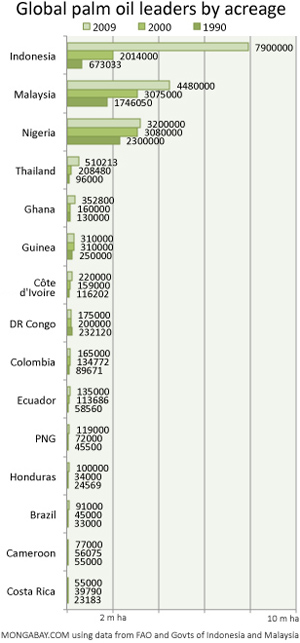Biofuels produced from oil palm plantations established on tropical peatlands are a substantial source of greenhouse gas emissions, reports a comprehensive new assessment conducted for the International Council on Clean Transportation (ICCT).
The research, based on a literature review and analysis of scientific methods used to derive emissions estimates, concludes that palm oil produced in peatland areas generates 86 metric tons of carbon dioxide per hectare per year over a 50-year time period, well above the 50 ton estimate used previously. Annualizing emissions over a 20-year period — as required under the EU Renewable Energy Directive — boosts the figure to 106 tons of CO2 per year.
The findings have significant implications for E.U. biofuels policy, which requires biodiesel and ethanol to offer emissions savings relative to conventional fossil fuels.
 Most palm oil is currently used for cooking oil, processed foods, cleaning products, and cosmetics. |
“Although the climate change impacts of palm oil production on tropical peatland are becoming more widely recognized, this research shows that estimates of emissions have been drawn from a very limited number of scientific studies, most of which have underestimated the actual scale of emissions from oil palm,” said study co-author Ross Morrison of the University of Leicester. “These results show that biofuels causing any significant expansion of palm on tropical peat will actually increase emissions relative to petroleum fuels. When produced in this way, biofuels do not represent a sustainable fuel source.”
While palm oil production for biofuels has amounted to only a tiny fraction of total palm oil production to date, the palm oil industry has been counting on European biofuel mandates to significantly boost palm oil demand incoming years. The new findings could potentially limit the upside for palm oil-based biodiesel.
 Oil palm acreage for leading palm oil producers. By virtue of its high yield, palm oil is a cheaper substitute than other vegetable oils. Photo by: Rhett A. Butler. |
“It is important that the full greenhouse gas emissions ‘cost’ of biofuel production is made clear to the consumer, who may otherwise be mislead into thinking that all biofuels have a positive environmental impact,” said co-author Susan Page, also of the University of Leicester. “The findings of this research will be used by organizations such as the US Environmental Protection Agency, European Commission and California Air Resources Board to more fully account for greenhouse gas emissions and their uncertainties from biofuel produced from palm oil. This is essential in identifying the least environmentally damaging biofuel production pathways, and the formulation of national and international biofuel and transportation policies.”
“Recognizing that emissions are larger than previously thought will help regulators such as the US Environmental Protection Agency (EPA), European Commission (EC) and California Air Resources Board (CARB) identify which biofuel pathways are likely to lead to sustainable greenhouse gas emissions reductions,” added Chris Malins of the ICCT.
Other research has shown that several common biofuel feedstocks — including corn and rapeseed which have considerably lower yields than oil palm — also have high emissions from direct and indirect land use. Conversion and disturbance of carbon-dense ecosystems and application of fertilizers increases emissions from biofuel production. In the case of palm oil, clearing forest and draining peatlands — which release CO2 when water levels drop — are substantial sources of emissions.
Related articles
Could forest conservation payments undermine organic agriculture?
(09/07/2010) Forest carbon payment programs like the proposed reducing emissions from deforestation and degradation (REDD) mechanism could put pressure on wildlife-friendly farming techniques by increasing the need to intensify agricultural production, warns a paper published this June in Conservation Biology. The paper, written by Jaboury Ghazoul and Lian Pin Koh of ETH Zurich and myself in September 2009, posits that by increasing the opportunity cost of conversion of forest land for agriculture, REDD will potentially constrain the amount of land available to meet growing demand for food. Because organic agriculture and other biodiversity-friendly farming practices generally have lower yields than industrial agriculture, REDD will therefore encourage a shift toward from more productive forms of food production.
Limit palm oil development to lands that store less than 40 tons of carbon/ha – study
(08/06/2009) A new study finds oil palm plantations store less carbon than previously believed, suggesting that palm oil produced through the conversion of tropical forests carries a substantial carbon debt.
Smart biofuels that don’t hurt people or the environment are possible

(07/16/2009) Sustainable biofuels can be a reality but only in combination with reductions in fuel demand and increased productivity on existing agricultural lands, argue researchers writing in the journal Science. Five years ago biofuels were seen as a panacea for the world’s energy hunger and the need to address climate change, but increased production of biofuels soon contributed to a clutch of problems, including competition with food, resulting in rising prices, and large-scale conversion of rainforests and tropical grasslands for feedstocks, resulting in biodiversity loss and increased greenhouse gas emissions. Environmentalists and scientists condemned many biofuels — including ethanol produced from Midwestern corn ethanol and biodiesel generated from European rapeseed and Southeast Asian palm oil — as a short-sighted energy solution. Some biofuels were found to be even worse for the environment, and more costly, than conventional gasoline. However some researchers remain optimistic that smart biofuel production could help meet energy demand without hurting people or the planet. In a Science Policy Forum piece, David Tilman and colleagues explore some of these options, noting that biofuels can be produced in substantial quantities at low environmental cost
Biofuels 200 times more expensive than forest conservation for global warming mitigation
(08/27/2008) The British government should end subsidies for biofuels and instead use the funds to slow destruction of rainforests and tropical peatlands argues a new report issued by a U.K.-based think tank. The study, titled “The Root of the Matter” and published by Policy Exchange, says that “avoided deforestation” would be a more cost-effective way to address climate change, since land use change generates more emissions than the entire global transport sector and offers ancillary benefits including important ecosystem services.
Biofuels can reduce emissions, but not when grown in place of rainforests
(07/22/2008) Biofuels meant to help alleviate greenhouse gas emissions may be in fact contributing to climate change when grown on converted tropical forest lands, warns a comprehensive study published earlier this month in the journal Environmental Research Letters. Analyzing the carbon debt for biofuel crops grown in ecosystems around the world, Holly Gibbs and colleagues report that “while expansion of biofuels into productive tropical ecosystems will always lead to net carbon emissions for decades to centuries… [expansion] into degraded or already cultivated land will provide almost immediate carbon savings.” The results suggest that under the right conditions, biofuels could be part of the effort to reduce humanity’s carbon footprint.
Biofuels are worsening global warming
(02/07/2008) Converting native ecosystems for production of biofuel feed stocks is worsening the greenhouse gas emissions they are intended to mitigate, reports a pair of studies published in the journal Science. The studies follow a series of reports that have linked ethanol and biodiesel production to increased carbon dioxide emissions, destruction of biodiverse forest and savanna habitats, and water and air pollution.
Palm oil is a net source of CO2 emissions when produced on peatlands
(12/17/2007) Researchers have confirmed that converting peat forests for oil palm plantations results in a large net release of carbon dioxide, indicating industry claims that palm oil helps fight climate change are unfounded, at least when plantations are established in peatlands.
Is the oil-palm industry using global warming to mislead the public?
(11/23/2007) Members of the Indonesian Palm Oil Commission are distributing materials that misrepresent the carbon balance of oil-palm plantations, according to accounts from people who have seen presentations by commission members. These officials are apparently arguing that oil-palm plantations store and sequester many times the amount of CO2 as natural forests, and therefore that converting forests for plantations is the best way to fight climate change. In making such claims, these Indonesian representatives evidently are ignoring data that show the opposite, putting the credibility of the oil-palm industry at risk, and undermining efforts to slow deforestation and rein in greenhouse gas emissions.
UN warns on dangers of bioenergy
(05/09/2007) Biofuels offer “an extraordinary opportunity” to reduce greenhouse gas emissions but could make “substantial demands on the world’s land and water resources at a time when demand for both food and forest products is also rising rapidly,” said the U.N. in its first assessment on the growing bioenergy industry.